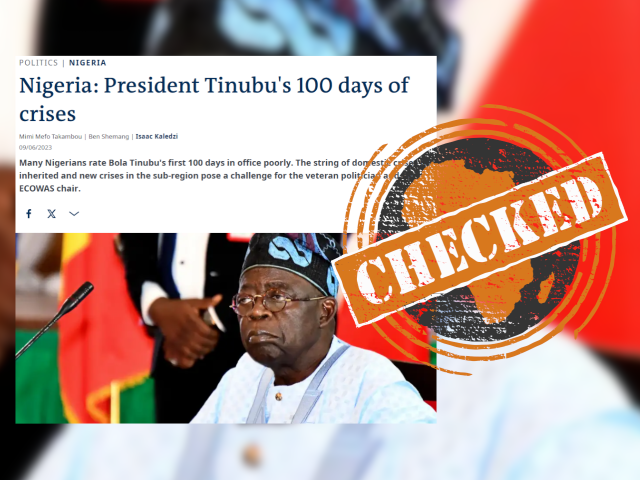This article is more than 5 years old
- The DA, South Africa’s official opposition, said it inherited a deficit of "over" R1 billion when it took over the City of Tshwane from the ANC in 2016.
- The DA said it turned that deficit into a surplus within a year.
- In 2015/16 Tshwane had an operating deficit of R1.4 billion, excluding grants from the national government. In 2016/17 it had an operating surplus of R730 million.
During the lively session Mmusi Maimane, leader of the official opposition Democratic Alliance, made a claim about the City of Tshwane’s finances. The metropolitan municipality is in Gauteng province. It is the home of the country's administrative capital, Pretoria.
“In Tshwane, we inherited a deficit of over R1 billion and in one year in office we’ve already turned that into a surplus,” he said.
The DA was elected to govern Tshwane in August 2016. That month it took over the running of the municipality from the African National Congress, South Africa’s ruling party.
What remained in the city coffers when the ANC left office? We took a closer look at the financial statements.
Claim not the first of its kind
Other DA officials have made similar claims.
In January 2018, then mayor of Tshwane Solly Msimanga released a press statement claiming his administration had clawed the city back from “financial ruin”. He said a deficit of R1.3 billion had been reversed.
A year later, DA member of parliament Phumzile Van Damme tweeted that her party had inherited a “R2bn deficit from the ANC... by the end of the first financial year in office, under DA-governance, it was corrected, with a surplus”.
But the ANC has repeatedly refuted the claim, arguing that it left behind a substantial surplus.
“In Tshwane, the ANC-led government left a surplus of R736 million in 2016/17,” said Gauteng’s head of social development, Nandi Mayathula-Khoza, during the Sona debate.
ANC regional chairperson Kgosi Maepa reportedly gave the same figure for the surplus.
Revenue less expenditure = surplus
A deficit occurs when any government spends more money than it collects, according to a guide to South African government budgets. Money is spent mainly on salaries and services like water and electricity. Money is collected from residents paying for services, rates, licences and fines, as well as from interest and investments.
A surplus is the opposite: more money is collected than is spent.
The formula “total revenue minus total spending” calculates whether there is a deficit or a surplus.
Surplus when ANC left office?
We contacted the DA’s media office for the source of its claim and were directed to Samkelo Mgobozi, then the Tshwane mayor’s spokesperson. (He has since been removed from the position.)
Mgobozi told Africa Check the figures were from the auditor general’s 2016/17 report on the municipality.
In an executive summary, the report says that at the end of the 2015/16 financial year, the City of Tshwane had a surplus of R884.3 million. (Note: The end of the city’s financial year is 30 June. The DA took office in August 2016.)
But the city’s audited annual financial statements give a restated surplus of R1.1 billion. This figure includes corrections of accounting errors identified later.
Carlene van der Westhuizen is a research analyst at the International Budget Partnership in South Africa, a network that aims to make public finance systems more transparent. She told Africa Check the restated surplus was the best figure to use.
“It is the same as the amount stated in the 2018/19 budget,” she said.
So how did the DA calculate a deficit?
‘Surplus’ included national government grants
Mgobozi referred us to a 2018 press statement by Msimanga, which he said we could use to “cross check” the figures. It included a table calculating the financial performance of the municipality.
The figures are for the municipality’s operating budget and exclude “capital transfers recognised”.
Capital transfers are funds national treasury gives all municipalities. They are also known as equitable share, or “grant money”, according to the treasury’s director of local government budget analysis, Jordan Maja.
In 2016/17, the city collected 80% of its income from residents and received 20% in grants from the treasury.
“As a principle, we at national treasury always emphasise that when you are talking about deficit and surplus, we look at the operating side,” Maja told Africa Check.
“You cannot include capital [transfers], as most of it is not your own money.”
Van der Westhuizen directed Africa Check to the 2018/19 medium-term revenue and expenditure framework for the City of Tshwane for these figures.
When capital transfers from the treasury (some R2.45 billion) are excluded from the 2015/16 calculation, the result is an operating deficit of R1.4 billion.
In other words, the municipality run by the ANC spent more money than it collected.
Surplus in 2016/17
After almost a year of DA administration, the City of Tshwane recorded an operating surplus of R730 million for the 2016/17 financial year.
| Tshwane surplus and deficit excluding capital transfers | |
| 2015/16 | R1.4 billion deficit |
| 2016/17 | R730 million surplus |
Source: 2018/19 Medium-term revenue and expenditure framework for the City of Tshwane
Conclusion: Tshwane had a deficit in 2015/16 and a surplus in 2016/17.
The leader of the opposition Democratic Alliance claimed that when it took over government of the City of Tshwane from the African National Congress in August 2016, the municipality had a deficit of over R1 billion.
The DA said it turned that deficit into a surplus within a year.
But the city’s financial statements show a surplus of R1.1 billion in 2015/6, the year before the ANC left office.
However, that figure includes capital transfer grants from the national treasury. If the grants are excluded, the ANC left Tshwane with a deficit of R1.4 billion.
In 2016/17, when grants are also excluded, the DA administration collected a surplus of R730 million.
We therefore rate the DA’s claim as correct.




Add new comment